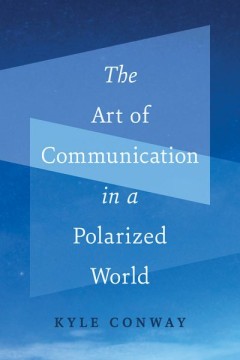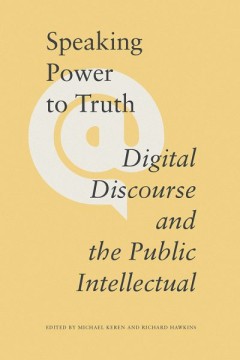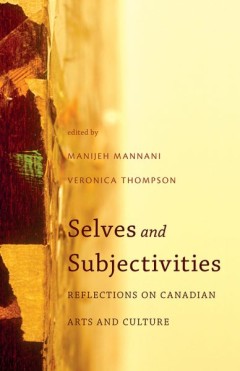Filter by

Familiar and Foreign Identity in Iranian Film and Literature
Challenging neocolonialist stereotypes, these critical excursions into Iranian literature and film reveal the limitations of collective identity as it has been configured within and outside of Iran. Through the examination of works by, among others, the iconic female poet Forugh Farrokhzad, the expatriate author Goli Taraqqi, the controversial memoirist Azar Nafisi, and the graphic novelist Mar…
- Edition
- -
- ISBN/ISSN
- 9781927356869.01
- Collation
- -
- Series Title
- -
- Call Number
- 272 pages

The Digital Nexus Identity, Agency, and Political Engagement
The trauma and tension in the daily lives of citizens as described here by McLuhan was only intensified by the arrival of digital media and the Web in the following decades. The rapidly evolving digital realm held a powerful promise for creative and constructive good—a promise so alluring that much of the inquiry into this new environment focused on its potential rather than its profound impa…
- Edition
- -
- ISBN/ISSN
- 9781771991292.01
- Collation
- -
- Series Title
- Cultural Dialectics
- Call Number
- 352 pages

Bomb Canada and Other Unkind Remarks in the American Media
Canada and the United States. Two nations, one border, same continent. Anti-American sentiment in Canada is well documented, but what have Americans had to say about their northern neighbour? Allan examines how the American media has portrayed Canada, from Confederation to Obama’s election. By examining major events that have tested bilateral relations, Bomb Canada tracks the history of anti-…
- Edition
- -
- ISBN/ISSN
- 9781897425497.01
- Collation
- -
- Series Title
- -
- Call Number
- 154 pages

The Art of Communication in a Polarized World
In this compelling new book, Kyle Conway confronts the communication challenges of our modern world by navigating the space between opposing perspectives. Conway explores how individuals can come to understand another person’s interpretation of the world and provides the tools for shaping effective arguments capable of altering their perspective. Drawing on the theory of cultural translation …
- Edition
- -
- ISBN/ISSN
- 9781771992930.01
- Collation
- -
- Series Title
- -
- Call Number
- 6 x 9, 172 pages

ABCs of Human Survival A Paradigm for Global Citizenship
The ABCs of Human Survival examines the effect of militant nationalism and the lawlessness of powerful states on the well-being of individuals and local communities―and the essential role of global citizenship within that dynamic. Based on the analysis of world events, Dr. Arthur Clark presents militant nationalism as a pathological pattern of thinking that threatens our security, while empha…
- Edition
- -
- ISBN/ISSN
- 9781897425688.01
- Collation
- -
- Series Title
- -
- Call Number
- 280 pages

Do teachers wish to be agents of change? : Will principals support them?
This study surveyed principals and teachers in ten countries to compare principal and teacher attitudes toward the involvement of teachers in several change and development responsibilities. The participating countries were: Australia, Canada, China, Hungary, Israel, Japan, Netherlands, Singapore, South Africa, and United States. Each country administered mirror versions of a questionnaire to s…
- Edition
- -
- ISBN/ISSN
- 9789462099593
- Collation
- xviii, 299 pages
- Series Title
- -
- Call Number
- 305.8

Speaking Power to Truth Digital Discourse and the Public Intellectual
Casting doubt on the assertion that online discourse, with its proliferation of voices, will somehow yield collective wisdom, Speaking Power to Truth raises concerns that this wealth of digitally enabled commentary is, in fact, too often bereft of the hallmarks of intellectual discourse: an epistemological framework and the provision of evidence to substantiate claims. Instead, the pursuit of t…
- Edition
- -
- ISBN/ISSN
- 9781771990332.01
- Collation
- -
- Series Title
- -
- Call Number
- 216 pages

The Dynamics of Transculturality
The purpose of this volume is to identify and analyze the mechanisms and processes through which concepts and institutions of transcultural phenomena gain and are given momentum. Applied to a range of cases, including examples drawn from ancient Greece and modern India, the early modern Portuguese presence in China and politics of elite-mass dynamics in the People’s Republic of China, the boo…
- Edition
- -
- ISBN/ISSN
- 978-3-319-09740-4
- Collation
- IX, 277
- Series Title
- Transcultural Research – Heidelberg Studies on Asia and Europe in a Global Context
- Call Number
- -

Living with Biodiversity in an Island Ecosystem: Cultural Adaptation in the S…
This book presents a detailed case study of ecological and cultural interactions between the people and their natural environment at Roviana Lagoon, Solomon Islands, a land of rich biodiversity. This volume documents the subsistence lifestyle of the people and their indigenous ecological knowledge, analyzes the effects of recent socioeconomic changes on the people and ecosystem, and proposes fu…
- Edition
- -
- ISBN/ISSN
- 978-981-287-904-2
- Collation
- -
- Series Title
- -
- Call Number
- -

Selves and Subjectivities Reflections on Canadian Arts and Culture
As critic Diana Brydon has argued, contemporary Canadian writers are “not transcending nation but resituating it.” Drawing together themes of gender and sexuality, trauma and displacement, performativity, and linguistic diversity, Selves and Subjectivities offers an exciting new contribution to the multivocal dialogue surrounding the Canadian sense of identity.
- Edition
- -
- ISBN/ISSN
- 9781926836492.01
- Collation
- -
- Series Title
- -
- Call Number
- 275 pages
 Computer Science, Information & General Works
Computer Science, Information & General Works  Philosophy & Psychology
Philosophy & Psychology  Religion
Religion  Social Sciences
Social Sciences  Language
Language  Pure Science
Pure Science  Applied Sciences
Applied Sciences  Art & Recreation
Art & Recreation  Literature
Literature  History & Geography
History & Geography